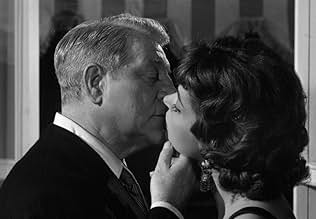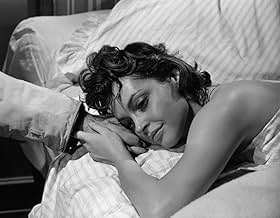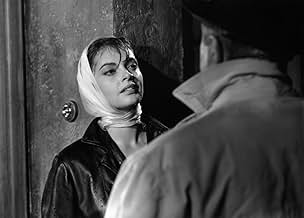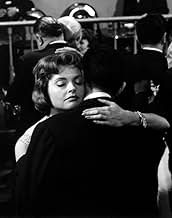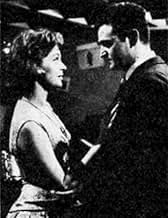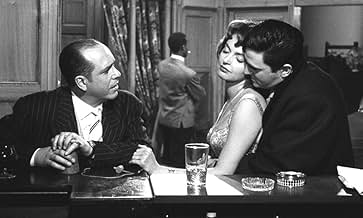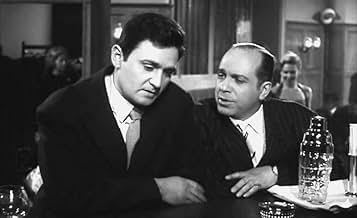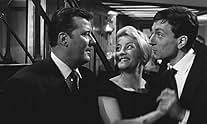A vice inspector for the Paris police takes special interest in the plight of drug-addicted Lucky whom he considers to be more victim than criminal.A vice inspector for the Paris police takes special interest in the plight of drug-addicted Lucky whom he considers to be more victim than criminal.A vice inspector for the Paris police takes special interest in the plight of drug-addicted Lucky whom he considers to be more victim than criminal.
Featured reviews
It is rare for a translated title of a film to be more inspired than the original title. I think this is the case with 'Le desordre et la nuit' directed in 1958 by Gilles Grangier, one of the most prolific French film directors in the first two decades after the Second World War, and a regular collaborator of Jean Gabin, who dominates the cast of this film. The English title is 'The Night Affair', which is much more appropriate in my opinion for the story and atmosphere of this film that combines a police investigation, a sentimental thread and a social investigation into the nightlife of Parisian clubs, infested by dubious business, prostitution and drug trafficking. The presence of Jean Gabin is one but not the only reason why this film, even if it is not a masterpiece, deserves a viewing or re-viewing even over 60 years after its production.
Police Inspector Georges Vallois (Jean Gabin) is one of the police officers investigating the murder of a club owner in the sparkling Parisian night life of the 1950s. Among the suspects is Lucky Fridel (Nadja Tiller), a young German woman aspiring to be a singer, apparently one of those many girls who populate nightclubs mixing alcohol, drugs and prostitution, but who turns out to be a wealthy heiress with residency in one of the most expensive hotels in Paris. An improbable liaison develops between the two, after which Vallois decides to try to save the girl, proving her innocence and getting her out of the vicious circles in which she had sunk. Later in the story, a more mature woman appears, pharmacist Therese Marken (Danielle Darrieux), possibly Lucky's drug source, possibly more deeply involved in the crime being investigated.
I liked the atmosphere of the film, the scene of the Parisian nightclubs of the '50s, the jazz music. Hazel Scott, an American singer who had gone into exile in Paris in those years for political reasons, also starred in the film. The use of black and white film has today the effect of almost documentary authenticity. Nadja Tiller, an Austrian actress with many appearances in French and European films of the time, interprets very well the role of young Lucky, in an early and courageous approach to the theme of 'luxury' prostitution. The combination of crime, sex and on-screen music is very common today, but it was still very daring in 1958. The main problem of the film is in my opinion exactly Jean Gabin, an actor I love and admire. Gabin, perhaps the most appreciated French actor at the time, was making a transition from youth roles that largely belonged to the negative-romantic typology to the roles of maturity, mostly positive (he played Commissioner Maigret in three later films), or carrying conservative values. even when they were negative. His relationship with the young woman who may be his daughter is unbelievable not because of the age difference, but because Gabin had already adopted a paternal pose that does not fit well with romance. His kisses in this film are among the most devoid of passion in the history of cinema. On the other hand, the two dialogues in which he faces Danielle Darrieux are delicious, precisely because they have nothing to do with a sentimental intrigue. 'Le desordre et la nuit' deserves to be seen (also) for Jean Gabin, even if he seems to be acting in another film.
Police Inspector Georges Vallois (Jean Gabin) is one of the police officers investigating the murder of a club owner in the sparkling Parisian night life of the 1950s. Among the suspects is Lucky Fridel (Nadja Tiller), a young German woman aspiring to be a singer, apparently one of those many girls who populate nightclubs mixing alcohol, drugs and prostitution, but who turns out to be a wealthy heiress with residency in one of the most expensive hotels in Paris. An improbable liaison develops between the two, after which Vallois decides to try to save the girl, proving her innocence and getting her out of the vicious circles in which she had sunk. Later in the story, a more mature woman appears, pharmacist Therese Marken (Danielle Darrieux), possibly Lucky's drug source, possibly more deeply involved in the crime being investigated.
I liked the atmosphere of the film, the scene of the Parisian nightclubs of the '50s, the jazz music. Hazel Scott, an American singer who had gone into exile in Paris in those years for political reasons, also starred in the film. The use of black and white film has today the effect of almost documentary authenticity. Nadja Tiller, an Austrian actress with many appearances in French and European films of the time, interprets very well the role of young Lucky, in an early and courageous approach to the theme of 'luxury' prostitution. The combination of crime, sex and on-screen music is very common today, but it was still very daring in 1958. The main problem of the film is in my opinion exactly Jean Gabin, an actor I love and admire. Gabin, perhaps the most appreciated French actor at the time, was making a transition from youth roles that largely belonged to the negative-romantic typology to the roles of maturity, mostly positive (he played Commissioner Maigret in three later films), or carrying conservative values. even when they were negative. His relationship with the young woman who may be his daughter is unbelievable not because of the age difference, but because Gabin had already adopted a paternal pose that does not fit well with romance. His kisses in this film are among the most devoid of passion in the history of cinema. On the other hand, the two dialogues in which he faces Danielle Darrieux are delicious, precisely because they have nothing to do with a sentimental intrigue. 'Le desordre et la nuit' deserves to be seen (also) for Jean Gabin, even if he seems to be acting in another film.
I would be surprised were Gilles Grangier to be in anyone's pantheon of great directors but Jean Gabin liked him enough to make no less that twelve films with him. Their collaborations in the sixties do not alas amount to much but their films of the fifties are of great interest, notably 'Sang a la Tete' and this policier, adapted from his own novel by Jacques Robert with splendid dialogue by the ubiquitous Michel Audiard.
The human touch, so often lacking in hard-boiled films of this type, is supplied by Jean Gabin's 'straight and narrow cop' and Nadja Tiller's 'junkie'. It is their relationship that holds the film together. Although her character admits to being twenty-three, Fraulein Tiller is in fact nearer thirty here but there is still a twenty-five year difference in age between her and Monsieur Gabin. This does not seem to matter as he is well-tailored, keeps his clothes on, the lighting is subtle and they have a definite simpatico. Gabin again gets away with it the following year in the excellent 'En Cas de Malheur' with an even younger Brigitte Bardot. Despite their rather gruff and blokish demeanor both Gabin and his natural successor Lino Ventura had a distinct chemistry with their leading ladies.
One of Gabin's favourite cinematographers Louis Page is again on duty here. The music is jazzy and might 'perhaps' have been influenced by Miles Davis' ground breaking score to 'L'Ascenseur pour L'Echafaud' released the same year.
There is also the presence of talented jazz pianist/vocalist Hazel Scott in what I believe is her only French film following her unfortunate departure from America. For those who have an interest I would strongly recommend the television documentary entitled, rather appropriately, 'Whatever happened to Hazel Scott?'
One must not forget, in fact one can never forget, the divine Danielle Darrieux. Her performance transcends what is, on paper anyway, a 'minor' role.
Policiers were becoming noticeably more hard-hitting during this period and despite containing elements which are bound to occasion a few 'tut-tuts' from the PC brigade, this one has certainly stood the test of time.
The human touch, so often lacking in hard-boiled films of this type, is supplied by Jean Gabin's 'straight and narrow cop' and Nadja Tiller's 'junkie'. It is their relationship that holds the film together. Although her character admits to being twenty-three, Fraulein Tiller is in fact nearer thirty here but there is still a twenty-five year difference in age between her and Monsieur Gabin. This does not seem to matter as he is well-tailored, keeps his clothes on, the lighting is subtle and they have a definite simpatico. Gabin again gets away with it the following year in the excellent 'En Cas de Malheur' with an even younger Brigitte Bardot. Despite their rather gruff and blokish demeanor both Gabin and his natural successor Lino Ventura had a distinct chemistry with their leading ladies.
One of Gabin's favourite cinematographers Louis Page is again on duty here. The music is jazzy and might 'perhaps' have been influenced by Miles Davis' ground breaking score to 'L'Ascenseur pour L'Echafaud' released the same year.
There is also the presence of talented jazz pianist/vocalist Hazel Scott in what I believe is her only French film following her unfortunate departure from America. For those who have an interest I would strongly recommend the television documentary entitled, rather appropriately, 'Whatever happened to Hazel Scott?'
One must not forget, in fact one can never forget, the divine Danielle Darrieux. Her performance transcends what is, on paper anyway, a 'minor' role.
Policiers were becoming noticeably more hard-hitting during this period and despite containing elements which are bound to occasion a few 'tut-tuts' from the PC brigade, this one has certainly stood the test of time.
The owner of a Parisian night club is murdered, and Inspecteur Jean Gabin is assigned to the case. His investigation starts with the dead man's mistress, Nadja Tiller, with whom he begins an affair.
Although the movie seems set up for shock value, Gabin moves through it with his usual natural facility. The jazz credentials are impeccable, with a ten-minute opening sequence and Hazel Scott playing the piano, but it soon settles down into a mess where Fraulein Tiller seems to be moving into self-destruction. The cast includes Danielle Darrieux, Robert Manuel, and in tiny bits, Jean-Pierre Cassell and Jacques Marin.
Although the movie seems set up for shock value, Gabin moves through it with his usual natural facility. The jazz credentials are impeccable, with a ten-minute opening sequence and Hazel Scott playing the piano, but it soon settles down into a mess where Fraulein Tiller seems to be moving into self-destruction. The cast includes Danielle Darrieux, Robert Manuel, and in tiny bits, Jean-Pierre Cassell and Jacques Marin.
The old treasures of worldwide's cinema reachs us after DVD's advent, this month came out a box of French's Noir, inside it a little gem with the great Jean Gabin and Danielle Darrieux, this pleasant picture was directed by an unknown craftsman Gilles Grangier who wasn't got a propper respect like others french directors, but he owes nothing to anybody else, in fact a little masterpiece, driven it to smallest persons or invisibles ones who carry the world, besides Gabin desmiss any kind of feedback over such prominence who includes Darrieux too, all small characters has something to offer for the picture's success while still doesn't appeared here on IMDB yet, but cetainly in short time as soon as possible in face a priceless work!!
Resume:
First watch: 2018 / How many: 1 / Source: DVD / Rating: 8.75
Resume:
First watch: 2018 / How many: 1 / Source: DVD / Rating: 8.75
They form a couple that you don't forget: Inspector Georges Vallois (Jean Gabin) and Lucky Fridel (Nadja Tiller), the latter being a former miss Austria. Her beauty and her charm change the mind of the inspector and turn him away from his duties. There is a game of attraction and repulsion between both as never seen in French cinema. He could be her father. There is a scene where Vallois answers tho her father that she could end up in prostitution if her father does not give her money anymore. Does Valois feel pity for her? The novel by Jacques Robert inspired the experienced director Gilles Grangier to this movie with a peculiar ending. Also Thérèse Marken (Danielle Darieux) give the dialogues between her and Vallois a captivating tension. Vallois is a bit Maigret-like but he has his own touch and is more human. It is also remarkable that the writer Jacques Robert adapted later a novel of Georges Simenon for the screen (Maigret voit rouge). This movie has kept all its freshness after those years but the problem of junkies has still grown more.
Did you know
- TriviaFrench visa # 20248.
- ConnectionsFeatured in Voyage à travers le cinéma français (2016)
Details
- Release date
- Country of origin
- Language
- Also known as
- The Night Affair
- Filming locations
- Hôtel George V, 31 avenue George V, Paris 8, Paris, France(hotel exteriors)
- Production company
- See more company credits at IMDbPro
- Runtime
- 1h 33m(93 min)
- Color
- Sound mix
- Aspect ratio
- 1.66 : 1
Contribute to this page
Suggest an edit or add missing content

